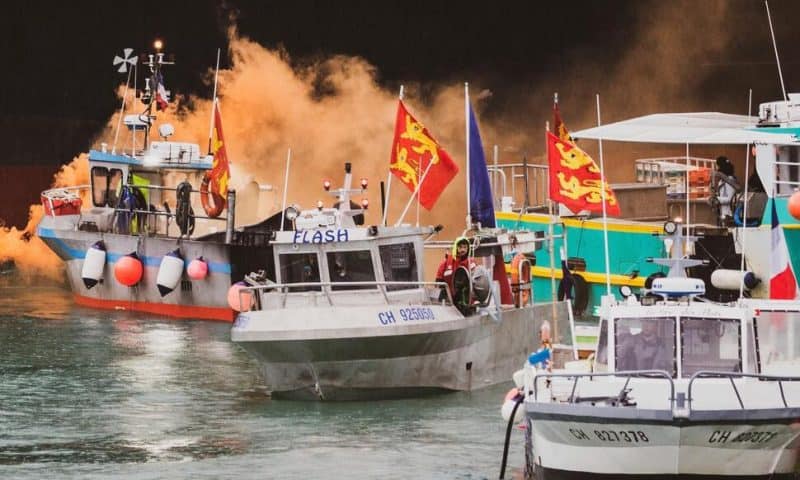Britain says it will summon the French ambassador for a dressing-down, the latest move in a worsening dispute over fishing licenses that has stoked tensions following the U.K.’s departure from the European Union.
LONDON — Britain said Thursday it would summon the French ambassador for a dressing-down, the latest move in a worsening dispute over fishing licenses that has stoked tensions following the U.K.’s departure from the European Union.
After French authorities fined two British fishing vessels and kept one in port overnight, Britain warned it would it retaliate if French officials followed through on threats to block British boats from some French ports and tighten checks on U.K. vessels unless French vessels get more permits to fish in U.K. waters. France also suggested it might restrict energy supplies to the Channel Islands, British Crown dependencies that lie off the coast of France.
“We believe these are disappointing and disproportionate, and not what we’d expect from a close ally and partner,″ U.K. Environment Secretary George Eustice told lawmakers, as Britain accused France of raising tensions.
Eustice said the threatened measures “do not appear to be compatible” with the Brexit divorce deal agreed by Britain and the EU ”or wider international law, and if carried through will be met with an appropriate and calibrated response.”
The reference to international law is sure to irk French officials, since EU nations have accused the U.K. of threatening to break the legally binding Brexit agreement it signed with the bloc setting out the conditions of its departure.
The U.K. government said France’s ambassador, Catherine Colonna, would be summoned to the Foreign Office, in an official sign of displeasure.
“We regret the confrontational language that has been consistently used by the French government on this issue, which makes this situation no easier to resolve,” the British government said in a statement.
Since the U.K. left the economic orbit of the EU in January, relations between London and Paris have become increasingly frayed as the nations on either side of the English Channel sort out a post-Brexit path.
France vehemently protested the decision last month by the U.K. and the Channel Island of Jersey to refuse dozens of French fishing boats licenses to operate in their territorial waters. Dozens of other licenses were granted. France says the restrictions are contrary to the post-Brexit agreement that Britain signed when it left the EU.
After weeks of negotiations, British authorities have issued more fishing licenses, but the number still only accounts for 50% of what France believes it “is entitled to,” French government spokesman Gabriel Attal said Wednesday.
“We have worked with the British, we gave them all the requested data, documents, information to back these (license) requests,” Attal said. “Our patience has reached its limits.”
Britain disputes that. The government says it has granted 98% of fishing license applications from European vessels, but there is a dispute over 31 boats that the U.K. says did not supply evidence to support their applications.
It was against this backdrop that French authorities fined the two British boats, one for failing to comply with checks by police and the other for not holding a proper license. The French Sea Ministry said the fines resulted from bolstered boating and license checks.
“We have been extremely patient … our fishermen have been extremely responsible,” France’s Europe minister, Clement Beaune, told French TV news channel CNews. “And so, from Nov. 2, it’s over. We will engage in dialogue if the British want to, but we are taking retaliatory measures.”
As part of the retaliatory measures, France “doesn’t exclude” actions that would target energy supplies to Britain, Beaune and French Minister of the Sea Annick Girardin said in a joint statement. Attal said the threat applied to the Channel Islands, which rely heavily on French electricity.
“To be very frank, I’m not happy about these measures,” Beaune later said at an event organized by the European Policy Center think tank. “We have to defend a very clear specific interest — fisheries — because it’s important and there is no reason why we should sacrifice it.”
“Either we increase (the retaliation) if the situation deteriorates, or we withdraw if the situation improves, it’s as simple as that,” he added.
Jersey, which is only 14 miles (22 kilometers) off the French coast, is a British Crown dependency outside of the U.K and can decide who is allowed to fish in its territorial waters. It has granted licenses based on its interpretation of the U.K.-EU trade deal and has accused France of acting disproportionately.
Barrie Deas, from the U.K.’s National Federation of Fishermen’s Organizations, called the “tit-for-tat” actions “unhelpful.″
“It may be normal enforcement action, but against the background of the threatening noises coming from the French government, it’s very concerning,″ Deas told the BBC. “France seems determined to escalate this issue about licenses, and I suppose we have to wonder why.”

